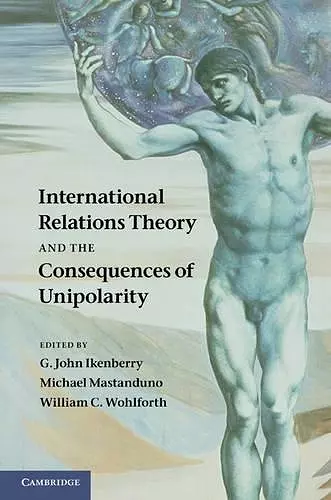International Relations Theory and the Consequences of Unipolarity
G John Ikenberry editor William C Wohlforth editor Michael Mastanduno editor
Format:Hardback
Publisher:Cambridge University Press
Published:1st Sep '11
Currently unavailable, and unfortunately no date known when it will be back
This hardback is available in another edition too:
- Paperback£30.99(9781107634596)

Discusses the concept of unipolarity and the political implications of US primacy for the patterns of international politics.
A systematic inquiry into the logic and dynamics of a one superpower world. A team of diverse and distinguished scholars provide surprising answers to the question of the extent to which, and how, American primacy matters for patterns of international politics.The end of the Cold War and subsequent dissolution of the Soviet Union resulted in a new unipolar international system that presented fresh challenges to international relations theory. Since the Enlightenment, scholars have speculated that patterns of cooperation and conflict might be systematically related to the manner in which power is distributed among states. Most of what we know about this relationship, however, is based on European experiences between the seventeenth and twentieth centuries, when five or more powerful states dominated international relations, and the latter twentieth century, when two superpowers did so. Building on a highly successful special issue of the leading journal World Politics, this book seeks to determine whether what we think we know about power and patterns of state behaviour applies to the current 'unipolar' setting and, if not, how core theoretical propositions about interstate interactions need to be revised.
'This brilliant volume is not only the best of its type in a very crowded academic market. Without even trying it knocks the props from out under the now popular myth that the world order is now undergoing a major transformation that is seeing the balance of power tilt from West to East with China - over time - replacing the United States as the single most important player in the international system. A terrific book which demonstrates why good international relations theory makes for sound political judgement about the world in which we all happen to live.' Michael Cox, London School of Economics and Political Science
'Most structural theories have ignored unipolarity and its consequences for international order. Here is a thought-provoking volume that seeks to redress that lacuna by bringing together key scholars to reflect rigorously on the polarity issue. They systematically assess the unipolar system and its manifold consequences. Together they offer several significant hypotheses to scholars to assess structural power even when the unipolar moment appears to be slowly eroding.' T. V. Paul, McGill University
ISBN: 9781107011700
Dimensions: 233mm x 155mm x 20mm
Weight: 740g
392 pages